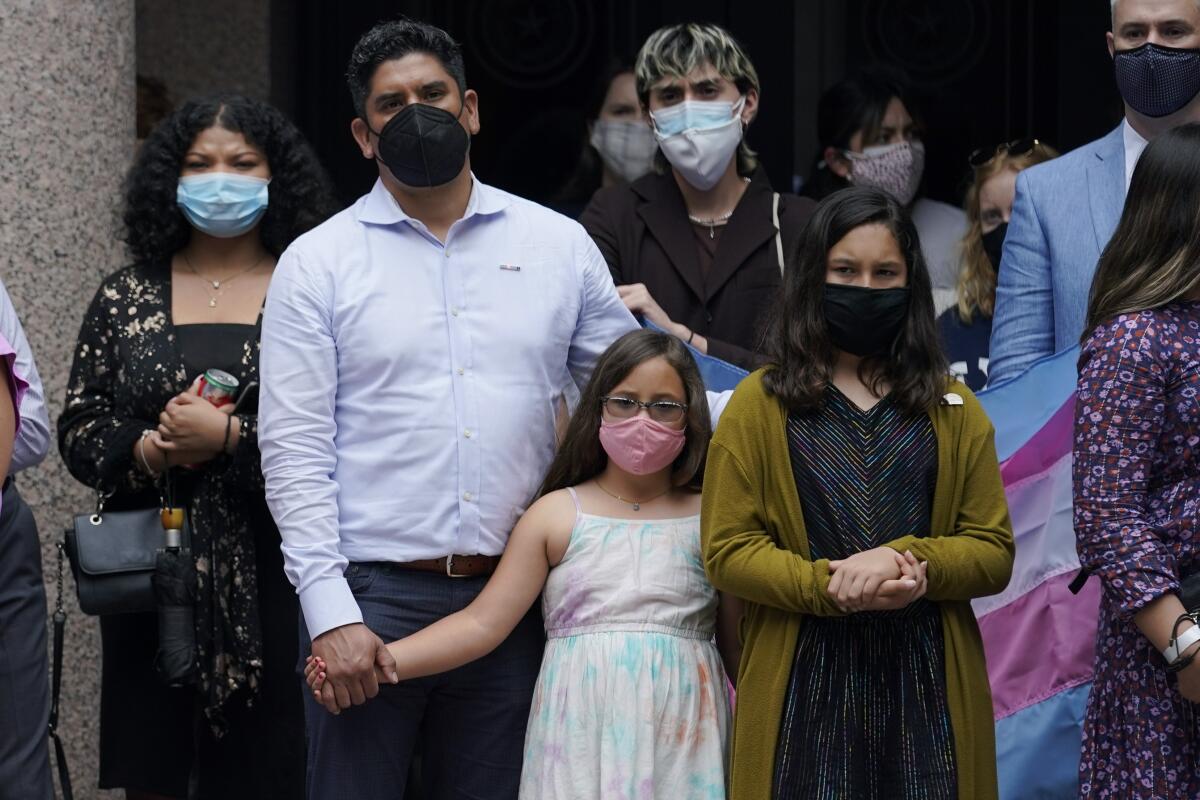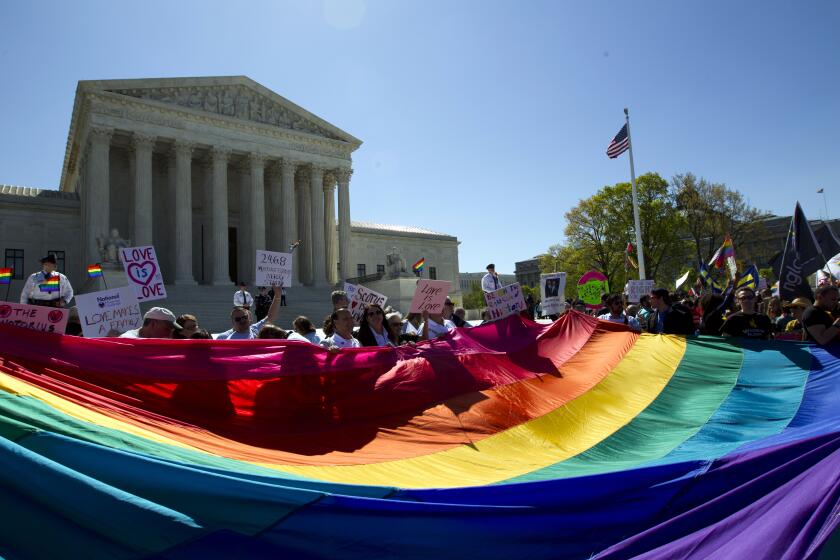Op-Ed: Denying trans youth gender-affirming care is an affront to science and medical ethics

- Share via
This year has seen an array of anti-transgender legislation. Florida Gov. Ron DeSantis’ administration is pursuing policies to restrict transition-related care for transgender minors and to block Medicaid coverage of this care for anyone. In 2022, legislation in 20 states so far has been introduced purporting to “protect” trans youth — by criminalizing care that has been used safely worldwide for decades.
There have been two notable recent victories protecting trans healthcare. A preliminary injunction in Alabama blocked enforcement of the state’s ban on gender-affirming drug treatments for minors, and the Texas Supreme Court halted a state investigation into one family with a transgender minor prompted by Gov. Greg Abbott’s attempt to treat gender-affirming care as “child abuse.” Although these rulings are important, they cannot counter state legislatures relying on toxic distortions and outright falsehoods about science to push anti-trans policy.
What these legislative efforts ignore is that gender-affirming care is standard medical care, supported by major medical organizations in the United States, including the American Academy of Pediatrics (and its Alabama chapter), the American Medical Assn., the Endocrine Society, the American Psychological Assn. and the Texas Medical Assn. These treatments are not experimental.
Now Florida Gov. DeSantis wants to strip medical care from transgender children and adults.
Legislation attacking medical care for transgender youth marks a new extreme for scientific misinformation in the America. Years of study and scientific scrutiny have established safe, evidence-based guidelines for delivery of lifesaving, gender-affirming care. Medical ethics as outlined in the Hippocratic oath and professional guidelines not only permit but require doctors to provide it.
The new laws aim to make it a crime for doctors to act ethically. In the meantime, transgender youth endure untreated pain, and some will die: Recent research reports that more than half of transgender youth seriously contemplated suicide and 20% attempted suicide in the previous year. At the same time, researchers have reported that suicide risk decreases with gender affirming medical intervention — indicating that every such death is preventable. Medical and legal communities must join forces with the broader public to counter wrong information and harmful policy that blocks essential healthcare.
Many of these state proposals are put forth with justifications that seem “scientific,” but cannot withstand actual scientific scrutiny, as we showed in a new report produced with colleagues at Yale and the University of Texas Southwestern.
The Alabama law is Exhibit A. The state claimed that gender-affirming care for minors is experimental and so dangerous that teens and their parents cannot truly consent. But this is nonsense, as U.S. District Court Judge Liles Burke ruled. Parents weigh the risks and benefits in the same way they consider any widely accepted medical treatment, in consultation with the child who will receive the care.
Alabama’s law further claims there is no proven benefit to gender-affirming care. In fact, numerous studies have shown that gender-affirming medical treatment measurably improves mental health and can reduce anxiety, depression and disordered eating as well as suicide risk among transgender teens.
Nor is it true, as the Alabama law states, that gender-affirming care, including surgery, is pushed on hapless children by physicians. Gender-affirming medical treatment is provided to adolescents, not to prepubescent children. Major scientific organizations provide medical protocols to guide doctors and parents, permitting drug therapy only when a teen has a diagnosis of gender dysphoria, only when medically necessary and only after a rigorous consent process that involves a mental health professional, parents or guardians and a specialist physician. Medical guidelines do not recommend genital surgery before someone reaches legal adult age.
After the fall of Roe vs. Wade, abortion and other culture war issues are likely to be hashed out state by state. The equality movement is outgunned by the radical right.
The American Academy of Pediatrics and other medical organizations filed an amicus brief to correct the record in the Alabama case. Major medical associations should do the same in other cases as they arise. Still, there are limits to litigation: Lawsuits take time, and because each state’s law is different, litigators must file cases challenging the new measures in every state — playing legal whack-a-mole while lives hang in the balance.
So far, legal ethics have not provided a check against biased science. An attorney general has a special duty of diligence as the state’s highest legal officer, and legislators may take an oath to “honestly discharge” their duties. But Alabama legislators and the Texas attorney general, whose legal opinion provided cover for the Texas action, violated these standards by promoting factual distortions.
Biased accounts of healthcare from anti-science activists are difficult for non-experts to debunk. That’s why medical organizations need to work with lawyers’ organizations, such as the American Bar Assn., to combat the misuse of science before it becomes law. Those efforts might include legislator-education programs to acquaint lawmakers with the actual medical standards for transgender care.
Additional measures might include having groups of medical and legal experts ready to provide detailed, rapid responses to misstatements of science. These rebuttals could be invaluable to journalists and the public as they look for facts amid political noise.
Ultimately, the battle for best medical practice requires a united front. Every member of the public should resist laws that obstruct standard care. Younger generations are watching to see how we protect their rights. The stakes are highest for transgender teens and those who care for them, but we all have a stake in holding politicians accountable to the truth.
Christy Olezeski is director of the Yale Pediatric Gender Program and an associate professor at the Yale School of Medicine, where Meredithe McNamara is an assistant professor. Anne Alstott is a professor at Yale Law School.
More to Read
A cure for the common opinion
Get thought-provoking perspectives with our weekly newsletter.
You may occasionally receive promotional content from the Los Angeles Times.












